Cinematography
English
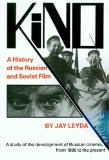  Kino: A History of the Russian and Soviet Film, by Jay Leyda. Princeton University Press; 3 edition, 1983. Paperback, 584 pages. Kino: A History of the Russian and Soviet Film, by Jay Leyda. Princeton University Press; 3 edition, 1983. Paperback, 584 pages.
"The Battleship Potemkin", "By the Law", "Mother", "Earth", "Man With a Movie Camera", "Alexander Nevsky": Russia and the Soviet Union produced some of the greatest films the world has ever seen. Leyda has written a riveting history of the pioneers and artists who made these films. His acclaimed book tells the story of the industry that spawned them and the revolution that both inspired and crushed them. (editorial review from Amazon)
"The only work to give such a full and fluent survey of that great area of film production which has been both a stimulus and an enigma to the rest of the world." (The New York Times Book Review)
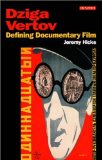  Dziga Vertov: Defining Documentary Film (KINO - The Russian Cinema). By Jeremy Hicks. I. B. Tauris, 2007. Paperback, 224 pages. Dziga Vertov: Defining Documentary Film (KINO - The Russian Cinema). By Jeremy Hicks. I. B. Tauris, 2007. Paperback, 224 pages.
"…the first English-language monograph devoted entirely to the career of Russia’s greatest documentary filmmaker…a valuable contribution to English-language scholarship on early Soviet cinema and an important resource to all those of us who teach the history of Russian or documentary cinema…" (Anthony Anemone, Slavic and East European Journal)
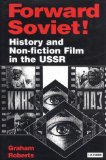  Forward Soviet!: History and Non-Fiction Film in the USSR (Kino : the Russian Cinema Series). By Graham Roberts. I. B. Tauris, 1999. Paperback, 256 pages. Forward Soviet!: History and Non-Fiction Film in the USSR (Kino : the Russian Cinema Series). By Graham Roberts. I. B. Tauris, 1999. Paperback, 256 pages.
The first comprehensive account of Soviet documentary output during the years between the Great October Socialist Revolution and the Great Patriotic War. Drawing on previously closed State archives, Graeme Roberts re-views the great examples of Soviet and world non-fiction cinema and uncovers many fine and intriguing little-known films. He discusses the careers of men and women who made them, including Vertov, Shub, Medvedkin and Karmen and investigates the problems of analysis and context, while offering valuable insights into that context. A powerful demonstration of how the history of Soviet non-fiction film can give insight into the agencies that shaped Soviet history and culture. (editorial review from Amazon)
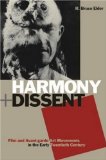  Harmony and Dissent: Film and Avant-garde Art Movements in the Early Twentieth Century (Film and Media Studies) by R. Bruce Elder. Wilfrid Laurier University Press, 2008. Hardcover, 540 pages. Harmony and Dissent: Film and Avant-garde Art Movements in the Early Twentieth Century (Film and Media Studies) by R. Bruce Elder. Wilfrid Laurier University Press, 2008. Hardcover, 540 pages.
R. Bruce Elder argues that the authors of many of the manifestoes that announced in such lively ways the appearance of yet another artistic movement shared a common aspiration: they proposed to reformulate the visual, literary, and performing arts so that they might take on attributes of the cinema. The cinema, Elder argues, became, in the early decades of the twentieth century, a pivotal artistic force around which a remarkable variety and number of aesthetic forms took shape.
To demonstrate this, Elder begins with a wide-ranging discussion that opens up some broad topics concerning modernity’s cognitive (and perceptual) regime, with a view to establishing that a crisis within that regime engendered some peculiar, and highly questionable, epistemological beliefs and enthusiasms. Through this discussion, Elder advances the startling claim that a crisis of cognition precipitated by modernity engendered, by way of response, a peculiar sort of “pneumatic (spiritual) epistemology.” Elder then shows that early ideas of the cinema were strongly influenced by this pneumatic epistemology and uses this conception of the cinema to explain its pivotal role in shaping two key moments in early-twentieth-century art: the quest to bring forth a pure, “objectless” (non-representational) art and Russian Suprematism, Constructivism, and Productivism. (editorial review from Amazon)
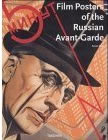  Film Posters of the Russian Avant-Garde, by Susan Pack. Taschen; Original edition. 1995. Hardcover, 320 pages. English. Film Posters of the Russian Avant-Garde, by Susan Pack. Taschen; Original edition. 1995. Hardcover, 320 pages. English.
Russian film posters of the 1920s and 1930s bear witness to the artistic creativity of the former Soviet Union in the years before Soviet Realism became the official art doctrine under Stalin. This book represents a survey of these works (Amazon editorial review).
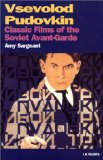  Vsevolod Pudovkin: Classic Films of the Soviet Avant-Garde (KINO - The Russian Cinema) by Amy Sargeant. I. B. Tauris, 2001. Hardcover, 232 pages. English. Vsevolod Pudovkin: Classic Films of the Soviet Avant-Garde (KINO - The Russian Cinema) by Amy Sargeant. I. B. Tauris, 2001. Hardcover, 232 pages. English.
Leon Moussinac, surveying the Soviet cinema scene in 1928, proclaimed Pudovkin, Eisenstein, and Vertov as its leading triumvirate. Yet there has been too little published on Pudovkin’s significant work in Soviet cinema. Amy Sargeant’s welcome book on Pudovkin assesses his career and his films, including the well-known features The Mother and The End of St. Petersburg, exploring their style and the circumstances surrounding their production. She also looks at the production and reception of his writings on film technique and performance, both inside the Soviet Union and in the West.
|

